The Mediation Support Unit (MSU) in the Department of Political and Peacebuilding Affairs (DPPA) serves as the UN system-wide focal point on mediation expertise and support. The Unit, inter-alia, provides tailored operational support to peace and dialogue processes through expert staff from the Unit and the Standby Team of Senior Mediation Advisors (SBT).
What We Do
MSU’s core competencies include operational assistance with mediation and peace processes, targeted capacity building to partners, and developing mediation guidance, lessons learned, and best practices.
MSU staff, including in-house experts on ceasefires, constitution-making, and process design, are able to provide tailored support throughout the planning, implementation and evaluation phases of a mediation process. The Unit also manages the Standby Team of Senior Mediation Advisers (SBT), which can be mobilized as a complementary mediation support capacity.
The Unit organizes a series of flagship trainings, including the UN High Level Mediation Course, the Ceasefire Mediation Course and the Women in Ceasefire Negotiations Course. MSU furthermore develops and maintains guidance and resources for mediators. This includes a searchable database of peace agreements – allowing mediators to compare language across some 75,000+ provisions of 1,300 agreements. When requested, MSU also provides tailored guidance, often involving comparative case analysis, to field missions.
MSU partners frequently with various regional organizations. It is also a member of several mediation networks, including the Group of Friends on Mediation and the Mediation Support Network, and engages regularly with the Global Alliance of Regional Women Mediator Networks.
DPPA’s mediation support capacity relies predominantly on funding from the Multi-Year Appeal (MYA) – including to allow for on-the-ground support to peace discussions. Sustained funding will allow MSU to continue to deploy operational expert support where needed and to develop innovative approaches and mediation guidance in emerging fields such as digital technologies, climate, local and sub-national mediation, and the youth, peace and security agenda.
Global

Flexible

Fast

Innovative & Inclusive

Expanding Our Knowledge and Helping Others to Learn
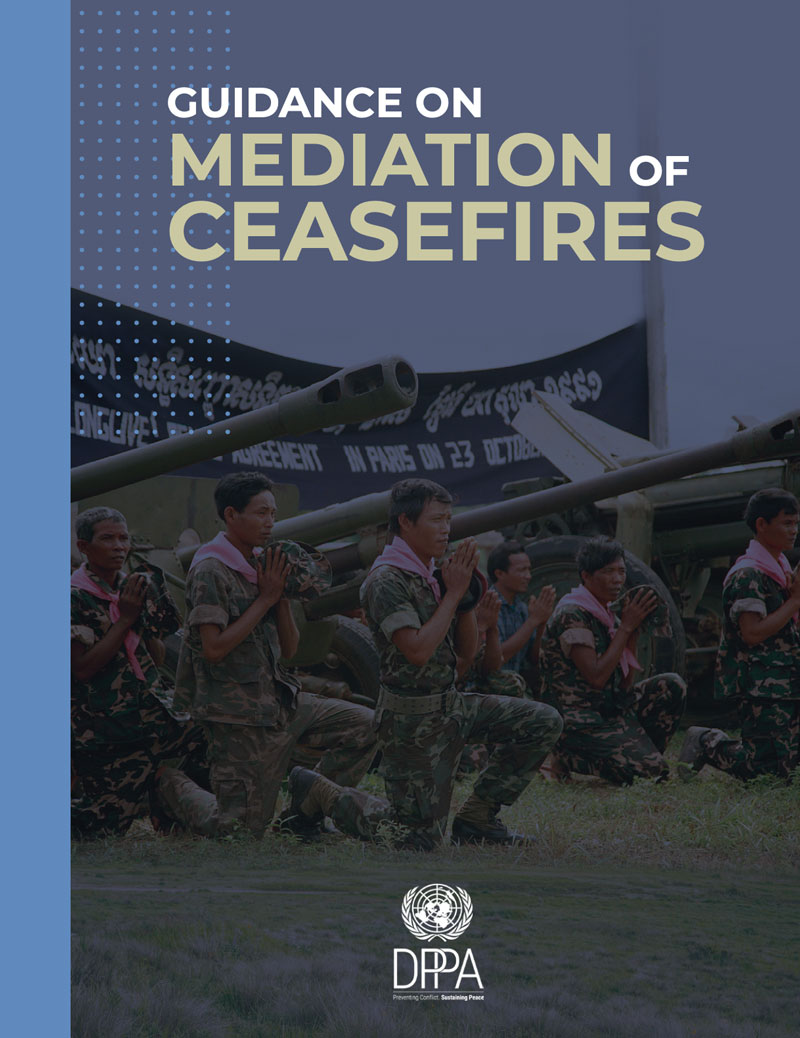
The Guidance is designed to support United Nations senior leader- ship and staff, mediators, and facilitators within and outside the UN, along with their teams, conflict parties, representatives of States and regional organizations, national and international non-governmental organizations, women’s groups and other stakeholders in peace processes.
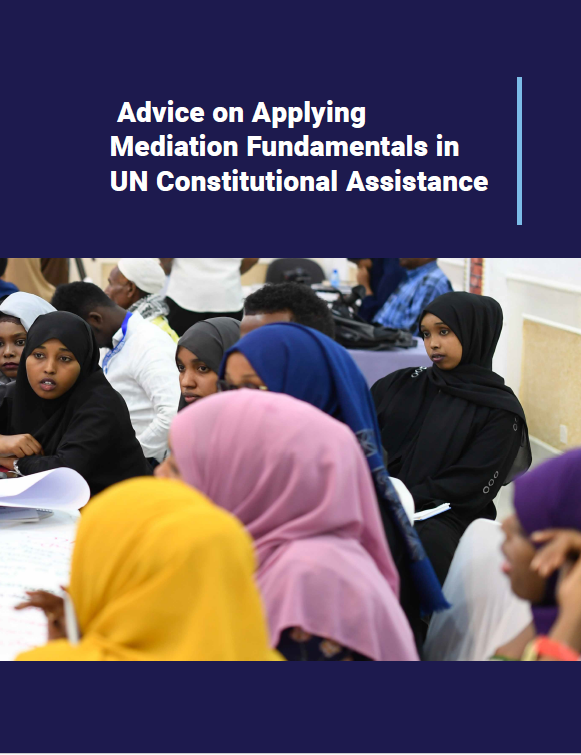
This paper captures key lessons learned in the author's two-year secondment to the Department of Political and Peacebuilding Affairs (DPPA) Policy and Mediation Division, Mediation Support Unit, during which the author supported constitution-making processes and provided advice on handling constitutional issues.
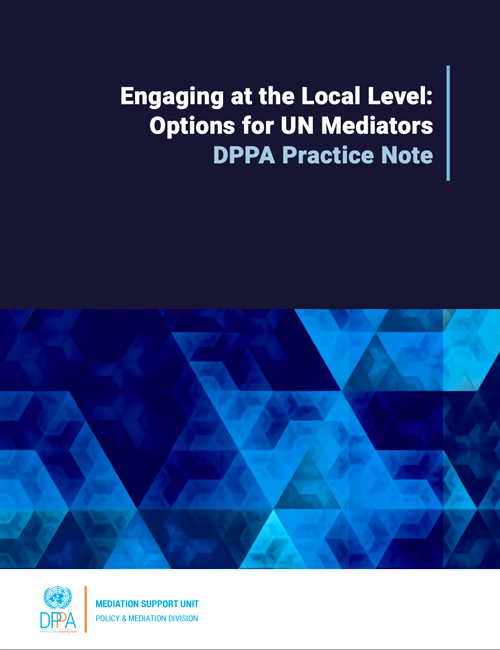
This Practice Note outlines circumstances under which more direct involvement with local conflicts and mediation processes might be strategically relevant for United Nations mediators working on national political processes.
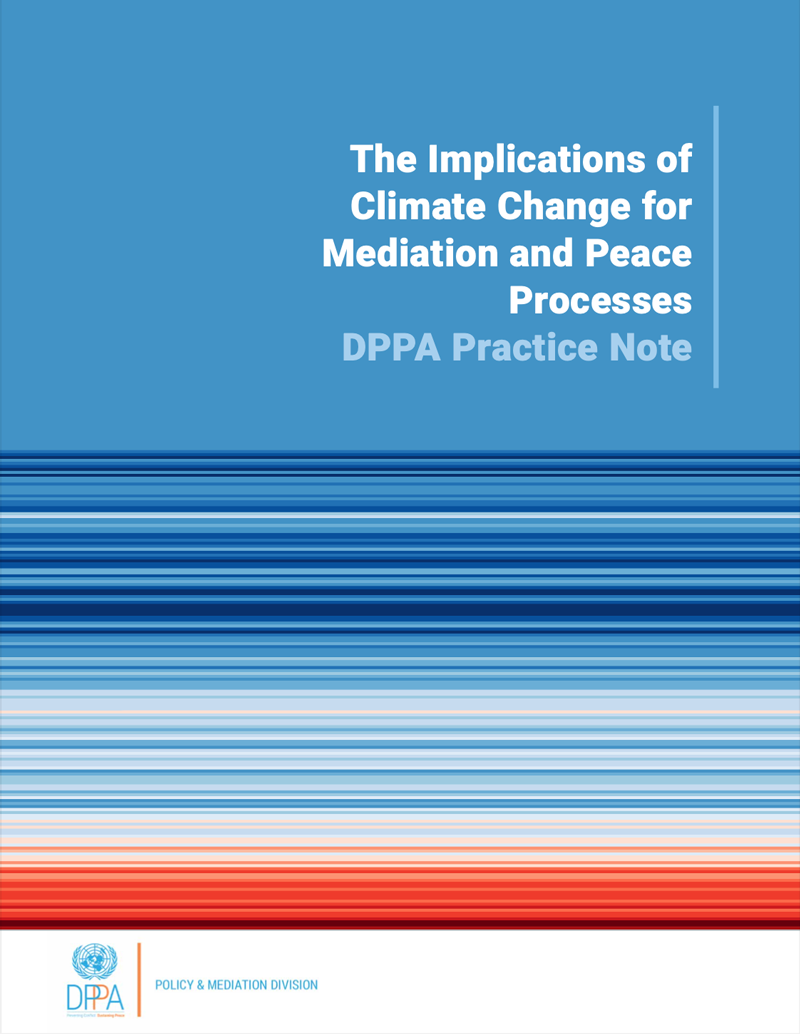
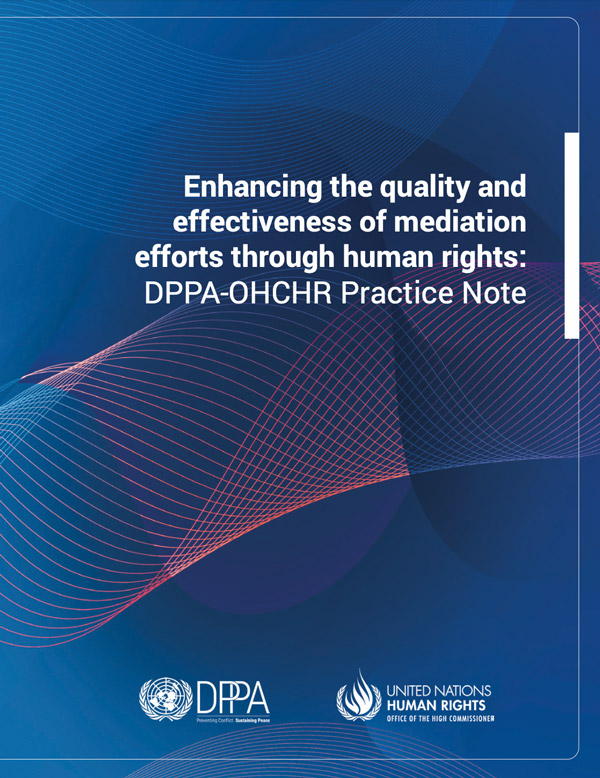
This practice note, a DPPA-OHCHR collaboration, delves into practical strategies and real-world examples to help mediators and human rights practitioners weave human rights principles and considerations into their work in general and in every step of mediation efforts specifically. The note shows that human rights offer practical solutions to many of the challenging issues that mediators try to address.
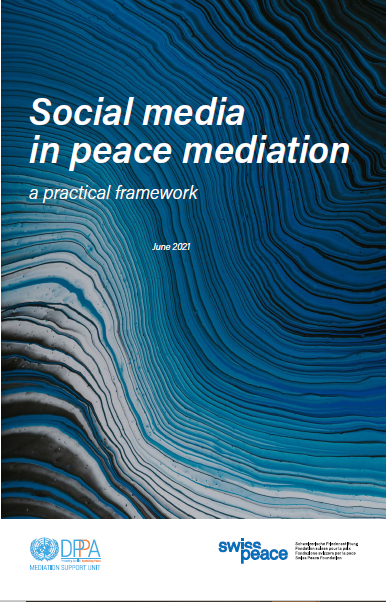
Produced jointly by DPPA Mediation Support Unit and swisspeace, this paper discusses the impact of social media on peace mediation, makes practical suggestions for mediators and their teams, and poses questions for further consideration and analysis. The paper also includes illustrative examples of practical social media uses.
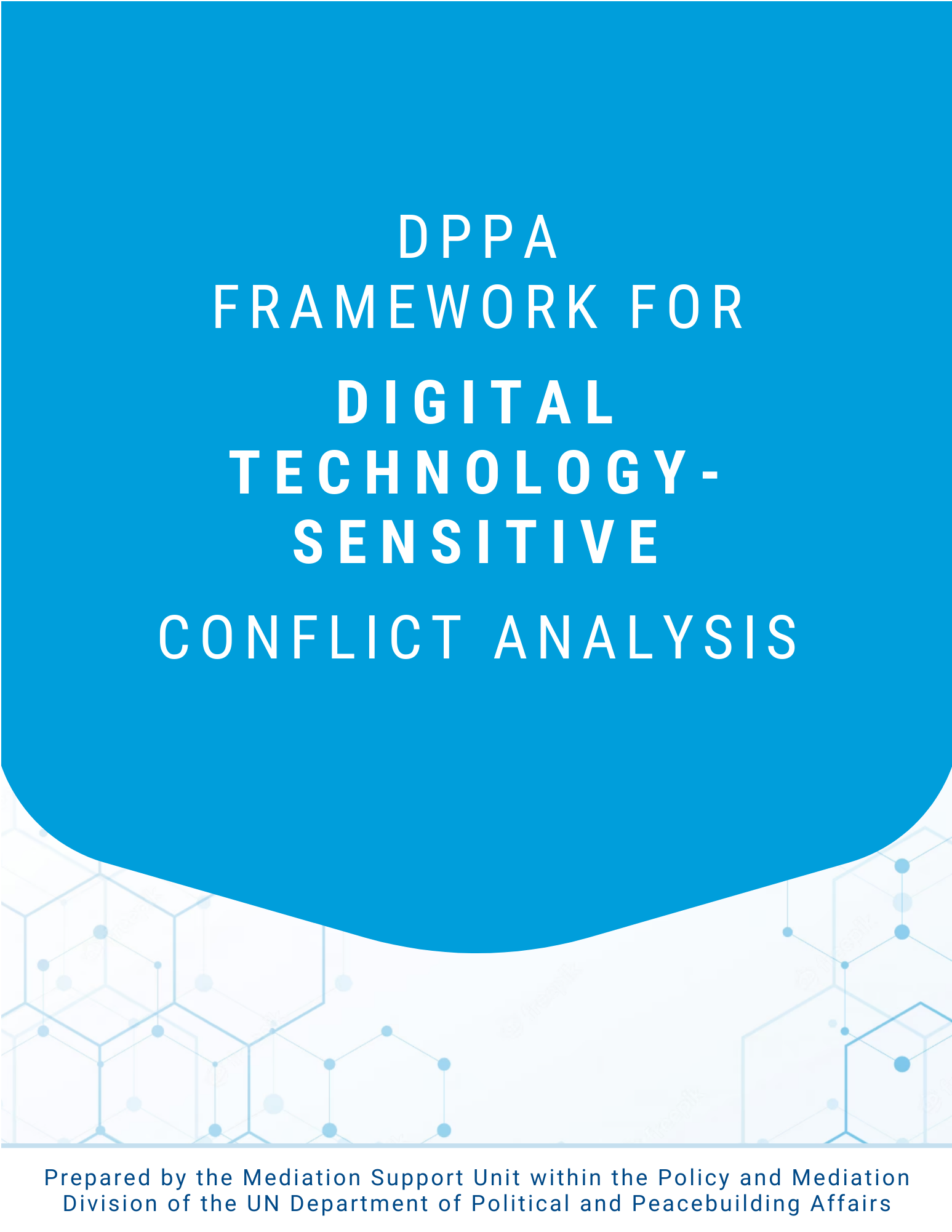
Digital technologies are also changing the character of conflict as parties increasingly rely on them to advance their objectives. Mediators and their teams need to consider additional factors such as the digital ecosystem of a given setting and how digital technologies and related data issues influence the power dynamics of a conflict. To address these new developments and help mediators and political affairs officers navigate the issues, the DPPA Policy and Mediation Division has prepared a Framework for Digital Technology-sensitive Conflict Analysis.
Visit the resources page for further guidance, policy and practice documents on mediation.
2024 Highlights

152 deployments of staff/advisors
upon request, for assistance in mediation

131 Standby Team mediation support assignments
in approximately 28 different contexts

Technical advice and support on gender and inclusion
provided to 100 per cent of all UN led and co-led peace processes
2024 Support by Theme
2024 Support by Region
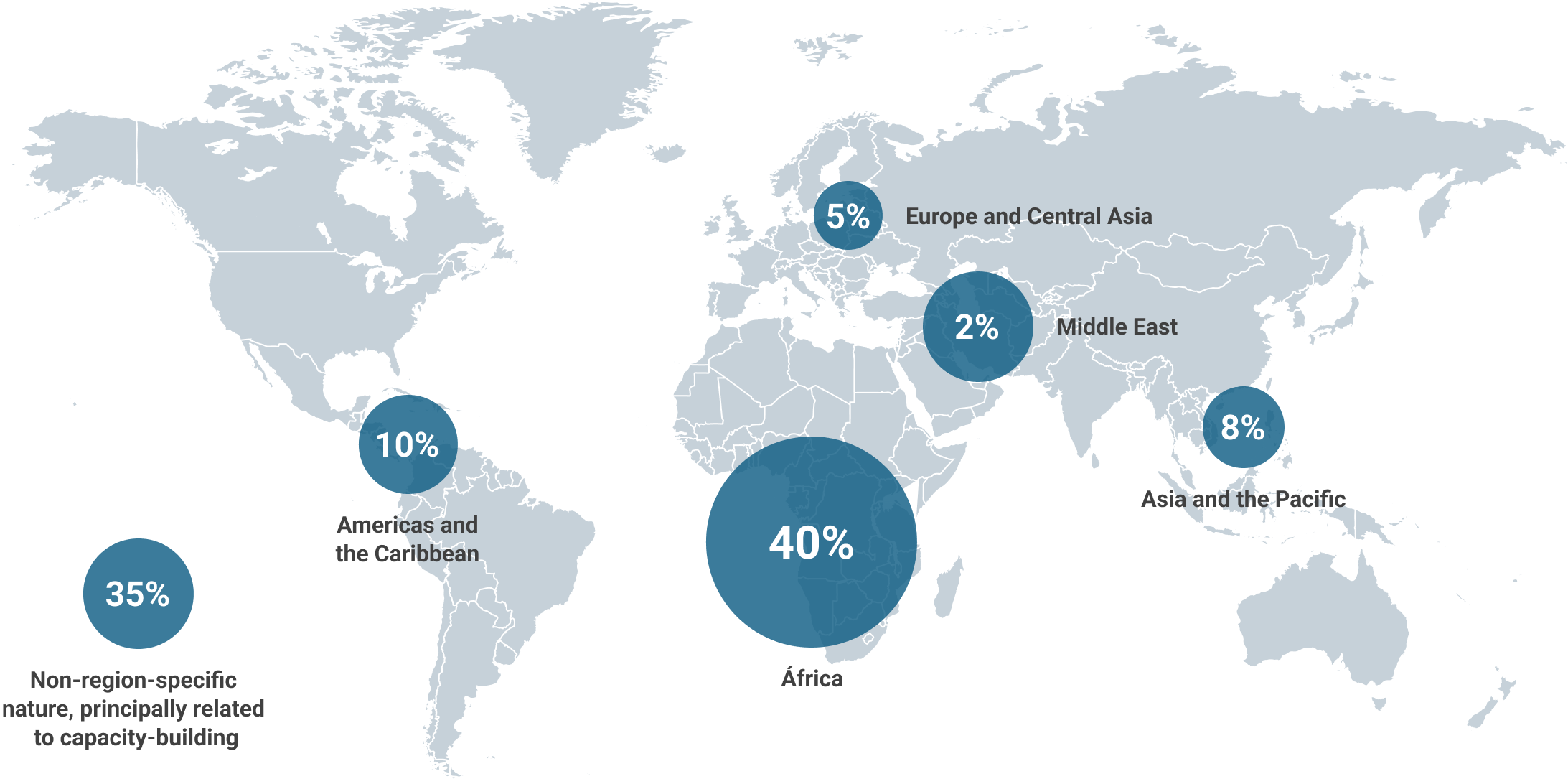

The Mediation Support Unit (MSU) in the Department of Political and Peacebuilding Affairs (DPPA) serves as the UN system-wide focal point on mediation expertise and support.
Snapshot of Current Activities
Updated on 16 July 2025
No activity during this period.
Central Asia
At the request of United Nations Regional Centre for Preventive Diplomacy in Centra Asia (UNRCCA), MSU and a SBT member contributed to the design and delivery of two virtual sessions on conflict prevention and mediation as part of UNRCCA’s Preventive Diplomacy Academy. This is an annual initiative that brings together 40-50 selected young people from across the Central Asia region and Afghanistan. The sessions provided an introduction and facilitated discussion on UN guidance regarding conflict prevention and mediation, and included a strong focus on mainstreaming gender, inclusion and WPS considerations into mediation and peacebuilding work.
Syria
During the quarter, MSU continued to support the Office of the Special Envoy for Syria (OSE-Syria) and the DPPA-DPO Middle East Division on issues related to Syria’s transitional process. This included an expert on constitutional issues mobilized through the SBT mechanism preparing background materials for OSE-Syria on comparative practice for constitution-making processes, providing expert advice to assist OSE-Syria’s engagement on the Syrian constitutional declaration, and joining OSE-Syria staff for a stocktaking on constitutional issues at OSE-Syria offices in Geneva in May.
Central Africa
On 13-14 May, MSU organized a workshop for the United Nations Regional Office for Central Africa (UNOCA) at the request of SRSG Abdou Abarry. The workshop was supported by the two SBT experts on process design as well as staff from the Policy and Mediation Division and the DPPA Electoral Affairs Division. It was designed to provide an opportunity for the SRSG and his senior leadership team to draw on DPPA and the SBT expert’s knowledge on mediation and dialogue and discuss how good practices in this field can inform and support the implementation of UNOCA’s current mandate as set out in S/PRST/2024/7.
The discussion drew on the UN’s normative frameworks and best practices to reflect on topics of relevance to Central Africa, including mediation, preventive diplomacy, good offices, gender and women’s political participation, and climate security. Participants also shared experiences in the region of making use of good offices to prevent conflict especially during election cycles and concrete tools that could be used to enhance women’s participation in all phases of the electoral cycle, including voter registration, as candidates and in elections monitoring.
Democratic Republic of Congo (DRC)
Upon the request of United Nations Organization Stabilization Mission in the Democratic Republic of Congo (MONUSCO), MSU deployed an SBT process design expert to Ituri Province in the North-Eastern part of DRC from 22 April to 2 May 2025. The expert's task was to contribute to enhancing the operational capacity of members of the Inter-Faith Network for Peace in the Ituri (RIPI) to enable them to carry out reconciliation and mediation more effectively. The expert contributed to finalizing the agenda and facilitated a two and a half-day workshop with Members of the RIPI. The workshop equipped participants with practical skills to engage in mediation and covered topics such as conflict analysis, mediation process design, mapping conflict actors and preparation of a roadmap for a dialogue process. Following the workshop, the expert supported participants to begin developing a mediation strategy to address two local conflict situations. This support builds on previous deployments from 2024 that helped religious leaders to develop provincial engagement strategies in three provinces in eastern DRC.
Separately, on 2-3 April, MSU deployed two SBT experts (gender and inclusion, process design) to Nairobi, Kenya to support the delivery of a high-level technical meeting for Congolese women. The meeting, which was organized by UN Women and the Office of the UN Special Envoy to the Great Lakes Region, convened key regional women activists and CSO representatives from Burundi, DRC, Kenya, Rwanda, and Uganda. Representatives from AU, MONUSCO, GIZ, and the EAC were also in attendance. The main objective of the meeting was to reflect on the evolving political and conflict dynamics in the Great Lakes region and to assess entry points for women’s meaningful participation in ongoing peace efforts. The experts served as resource persons and facilitators for sessions on women’s inclusion strategies and contributed to the elaboration of a roadmap that set short, medium, and long terms goals for women’s engagement with the mediation process. They also helped draft an advocacy note to amplify the voices and perspectives of women in the peace efforts and contributed to a concept note for the establishment of a gender advisory board. The advocacy note was presented to the DRC Minister of Foreign Affairs on 24 June in an event hosted by MONUSCO and UN Women.
Libya
During the last quarter, an SBT expert on process design assisted the United Nations Support Mission in Libya (UNSMIL) in finalizing its draft strategy for a multi-track political dialogue process, as well as related operationalization papers and documents to support the establishment of an Advisory Committee in February 2025. The role of the Committee was to propose sound, politically implementable options to resolve contentious issues that are delaying elections, with the goal of helping unify Libyan institutions and move towards peace and stability.
Following the conclusion of the work of the Advisory Committee on 5 May, and the publication of the Executive Summary of its report on 20 May, UNSMIL launched a series of nationwide and international consultations on the Committee’s proposed options. The objective of these consultations is to facilitate a nationwide, inclusive public debate about how to overcome the political impasse and gather Libyan views on the four options proposed by the Advisory Committee. On 20 June, UNSMIL and Germany co-chaired the Berlin Process International Follow-up Committee on Libya in Berlin to consolidate international support to UN efforts in advancing a political process.
In May 2025, MSU’s senior advisor on ceasefires and security arrangements provided remote technical advice to the Mission on potential UN support for the truce committee established by the Presidency Council of Libya and UNSMIL to facilitate a ceasefire in Tripoli.
Nigeria
Since 29 April, two Standby Team experts and one MSU staff have provided remote operational support to the Anglican Communion in Nigeria's Middle Belt to conduct a mapping of CSO partners working on conflict prevention and develop an interfaith early warning mechanism. The experts shared comparative models of early warning systems, including best practices from IGAD’s Conflict Early Warning and Response Mechanism (CEWARN) and Kenya’s National Early Warning System.
South Sudan
In response to the political and security situation in South Sudan, the Anglican Communion requested MSU expertise to design an intervention to help de-escalate tensions. This advice entailed recommendations on engaging with national and regional actors who have influence with the South Sudanese political leadership and the opposition to communicate messages in support of dialogue and promoting peaceful coexistence.
Sudan
On 15 April, the Office of the Personal Envoy for Sudan (OPESG-Sudan) convened a virtual brainstorming session with four SBT experts with experience working in Sudan between 2021 and 2024 on WPS issues. The purpose of the session was to update the Senior Gender Adviser of OPESG-Sudan on the work that they have been part of and identify strategic entry points for the Personal Envoy to advance WPS priorities in his work. The experts suggested an updated mapping of the women-led initiatives and groups; strengthened coordination at the technical level on WPS, linking up to the informal group of multilateral organizations convened by UN Women with the AU and IGAD; engaging with the NGOs and member states on WPS and potentially facilitating coordination between these actors; as well potential steps in follow up to the consultations held by OPESG in December 2024 with women’s groups.
As part of the broader support of OPESG-Sudan on various initiatives, the SBT expert on ceasefires conducted a capacity-strengthening intervention for a group of 37 Sudanese women convened by the Folke Bernadotte Academy (FBA) in collaboration with UN Women-Sudan on 19 April. The expert delivered a two-hour online session in the hybrid workshop that focused on lessons learned from the Colombian peace process, emphasizing the participation of women in the ceasefire negotiation process, including the creation of a gender sub-commission.
An SBT expert on gender and inclusion was also deployed to contribute technical inputs in a workshop convened by CMI – Martti Ahtisaari Peace Foundation in Nairobi, Kenya from 2-3 June. The workshop which included 28 Sudanese women from political parties, armed movements, civil society as well as women who came as ‘independent experts’ to discuss possible selection criteria for women to participate in future ceasefire and political negotiations as well as a unified agenda to support Sudanese women’s preparedness to engage in such talks. The expert participated in the development of a comprehensive Women’s Agenda, calling for a minimum of 40 per cent effective participation in all peace and political structures. The document has been shared with multilateral organizations and entities who are working on the mediation processes in Sudan.
Afghanistan
MSU continued to support the DPPA-DPO Asia and Pacific Division and United Nations Assistance Mission in Afghanistan (UNAMA) on process design questions and planning for ways forward to advance international engagement on Afghanistan in a more coherent, coordinated, and structured manner. The so-called Comprehensive Approach being pursued by UNAMA includes working groups in the private sector and counter narcotics as well as a mosaic of key issues of importance to the international community and de facto authorities.
Through the Comprehensive Approach, the UN seeks to put these issues into a more structured multilateral framework for dialogue and potential progress. It seeks to demonstrate to the de facto authorities and to Afghans that there is a pathway to reintegration; to describe in more detail the steps that are necessary for reintegration of Afghanistan into the international system; to maintain open channels for discussion and possible international cooperation; and, through the building of confidence, begin removing obstacles that impede further cooperation.
Following a request received by UNAMA, a SBT expert on gender and inclusion and an MSU staff member provided remote support to the Mission’s Comprehensive Approach Secretariat in developing options and specific strategies to pursue information sharing and engage in consultations with the Afghan public and technical experts on the proposed pathway forward.
Papua New Guinea
At the request of DPPA-DPO Asia and Pacific Division, MSU continued to provide technical and process design advice to the post-referendum consultation process between the Government of Papua New Guinea (GoPNG) and the Autonomous Bougainville Government (ABG). During April and May, an SBT process design expert provided remote support to the Independent Moderator, Sir Jerry Mateparae, on designing an inclusive and culturally relevant consultation framework, including on how to advance the meaningful participation of women and civil society in the process.
These efforts culminated in an in-person deployment by the expert from 6-15 June to support the high-level consultations in Burnham, New Zealand attended by GoPNG Prime Minister James Marape and ABG President Ishmael Toroama, as well as senior leaders from both sides. These consultations led to the endorsement in plenary of a draft Burnham Relationship Agreement that was officially signed on 26 June. An important milestone for the Bougainville peace process, now officially titled the “Melanesian Agreement” outlines a joint commitment by the GoPNG and the ABG to a peaceful, negotiated pathway forward, recognizing Bougainville’s referendum outcome and framing future relations within a Melanesian framework.
During his deployment, the SBT expert worked in direct support of Sir Mateparae’s team and provided technical and advisory support on process design and facilitation issues. He also worked to identify opportunities for advancing the inclusion of women in the process and bringing these to the attention of the moderator and his team.
Climate change, environment, and natural resources
Euphrates-Tigris Basin
The UN Environment Programme requested the support of multiple SBT members to provide remote feedback on how the UN could support enhanced cooperation on climate change and environmental issues across the Euphrates-Tigris basin, including through the sharing of comparative experiences from other regional contexts.
Disaster Risk Reduction
The UN Office for Disaster Risk Reduction requested an SBT expert on climate change, environment and natural resources to provide remote feedback on design considerations regarding integrating a disaster risk reduction lens into local peacemaking in East Africa.
Climate Security Mechanism and DPPA-DPO regional divisions
At the request of the Climate Security Mechanism and DPPA-DPO regional desks (Europe and Central Asia Division, Americas Division), the SBT member specialized on climate change, environment and natural resources participated in multiple virtual briefings on options for integrating climate and environmental factors into mediation and dialogue initiatives, shared comparative experiences, and developed a presentation on the use of climate risk assessments as an entry point in political processes in mission and non-mission settings.
Women’s Participation in Peace Processes
Common Pledge
On 8 May, MSU and DPPA’s Gender, Peace and Security Unit (GPS), together with the Permanent Representatives of Angola and Switzerland, co-hosted an expert-level discussion among adopters of the Secretary-General’s Common Pledge on Women’s Participation in Peace Processes. Twenty-five of the 32 adopting entities were represented in the in-person and virtual discussion, with 19 taking the floor to describe steps they have taken related to the Pledge. In addition to the two co-hosts, expert briefings were provided by FemWise-Africa, the Office of the Special Advisor to the Secretary-General on Cyprus and NOREF on good practice and lessons-learned on institutionalizing Common Pledge commitments. UN Women also shared information on the Women in Peace Processes Monitor, a tool which provides the latest data and analysis on women’s participation, complementing the Pledge.
Strengthening Mediation Capacity
UN High Level Mediation Course
From 14-20 June, MSU, in partnership with the Swiss Federal Department of Foreign Affairs, organized the annual UN High Level Mediation Course in Montreux, Switzerland.
This edition brought together 23 participants and senior resource people, including five SRSGs/DSRSGs (Haiti, Libya, Myanmar, Sudan, Syria), one HoM (United Nations Truce Supervision Organization), five Resident Coordinators (Angola, Chile, Costa Rica, Türkiye, Uruguay), senior DPPA-DPO officials as well as senior representatives from Member States, regional or sub-regional organizations (AU, OSCE), civil society experts and mediation think tanks. Participants exchanged experiences and discussed leveraging UN influence against the backdrop of a polarized and militarized geopolitical environment as well as an increasingly diverse and contested landscape of mediation actors and mandates. In response to demand from past participants, for the first time this year the program included a session dedicated to reflecting on the current geopolitical moment and its implications for UN prevention, mediation, and good offices work.
UN High Level Seminar on Gender
MSU supported the holding of the 14th UN High-Level Seminar on Gender and Inclusive Mediation Strategies from 23 to 25 April in Porvoo, Finland. The three-day Seminar is organized by GPS in collaboration with CMI – Martti Ahtisaari Peace Foundation and Peace Research Institute Oslo, with support from SBT process design and gender and inclusion experts. The experts assisted in the delivery of specific substantive sessions, for example on gender-sensitive ceasefires and security arrangements and leading a practical exercise in the form of a mediation simulation. This year’s iteration brought together around 27 senior officials and leading mediation actors from the UN, Regional Organizations, Member States and civil society. The Seminar aims to equip the participants with strategies and practical tools on advancing women’s inclusion and gender-sensitive approaches to mediation from process design to drafting and implementing peace agreements.
UN Ceasefire Mediation Course
The 12th iteration of the UN Ceasefire Mediation Course took place in Oslo, Norway in early April. This year’s Course brought together 28 participants from the UN (Headquarters, Special Political Missions and Peacekeeping Operations) and non-UN mediators and representatives of parties to conflicts from diverse contexts to develop specialized technical skills and to share experiences on the negotiation and implementation of ceasefires. It is organized by MSU staff experts in partnership with the Norwegian Ministry of Foreign Affairs, the Norwegian Defence International Centre and the Swiss Federal Department of Foreign Affairs. SBT experts on process design and ceasefires and security arrangements also assisted in the delivery of the Course.
SBT and staff online and in person engagements (webinars, panels, consultations)
During the second quarter, multiple experts from the SBT mechanism and MSU staff participated in different virtual discussion formats as panellists, speakers, and moderators. They also acted as expert facilitators in various capacity building exercises for the UN and its partners including: delivering a presentation on peace mediation and conflict prevention of Melbourne University’s Series of Conversations with Peacebuilders; joining as a panellist for the Berghof Foundation’s launch of its latest publication on Psychology in Peacemaking; attending a roundtable on ways to advance the WPS agenda, hosted by the Georgetown University’s WPS Institute; presenting the work of the SBT on process design with experiences on the Sudan and South Sudan at the Northwestern University Buffet Institute for Global Affairs; the MSU Team Leader serving as a respondent at a public event to launch the findings of a research project on “Mediation in Regionalized Intra-State Conflict” led by the Kroc Institute for International Peace Studies, mentoring the three-day role play at the 5th annual Kent Executive Seminar on Conflict Resolution at Columbia University School of International and Public Affairs; and delivering a presentation on mediation practices and dilemmas at the monthly meeting of the Texas Mediators’ Association.
Guidance, best practices, lessons learned, knowledge management
Group of Friends of Mediation
At a meeting of the Group of Friends of Mediation, held at the Permanent Mission of Finland in New York on 12 May 2025, DPPA Under-Secretary-General Rosemary DiCarlo provided the keynote address on the theme of discussing the challenges facing mediation efforts in today’s fractured global environment. She highlighted the risks posed by increasing geopolitical polarization, external military interventions, and fragmented internal conflicts, which collectively pose challenges to the core principles and norms of the UN Charter. Citing ongoing crises in Sudan, Gaza, the DRC, and Ukraine, she warned of the dangers of defaulting to military solutions over political negotiations. Ms. DiCarlo stressed the need for adaptive, multi-level mediation strategies, stronger collaboration among diverse actors, and more effective organization of the mediation space. She reaffirmed the UN’s commitment to supporting global mediation efforts through its good offices and technical expertise, even when not in the lead, and called on Member States to coordinate efforts and complement each other’s strengths to address the growing complexity of conflict resolution.
Several Permanent Representatives who spoke at the event expressed their strong support for UN peace-making efforts.
Peacemaker website
During the reporting period, MSU launched the Chinese and Arabic versions of the Peacemaker website. Peacemaker is now available in all six official UN languages, which fully complies with UN multilingualism requirements. The UN Peacemaker website is managed by MSU and is intended to connect peace-making professionals with PMD’s resources, including a database of peace agreements, guidance materials, and information on accessing PMD's mediation support services.
